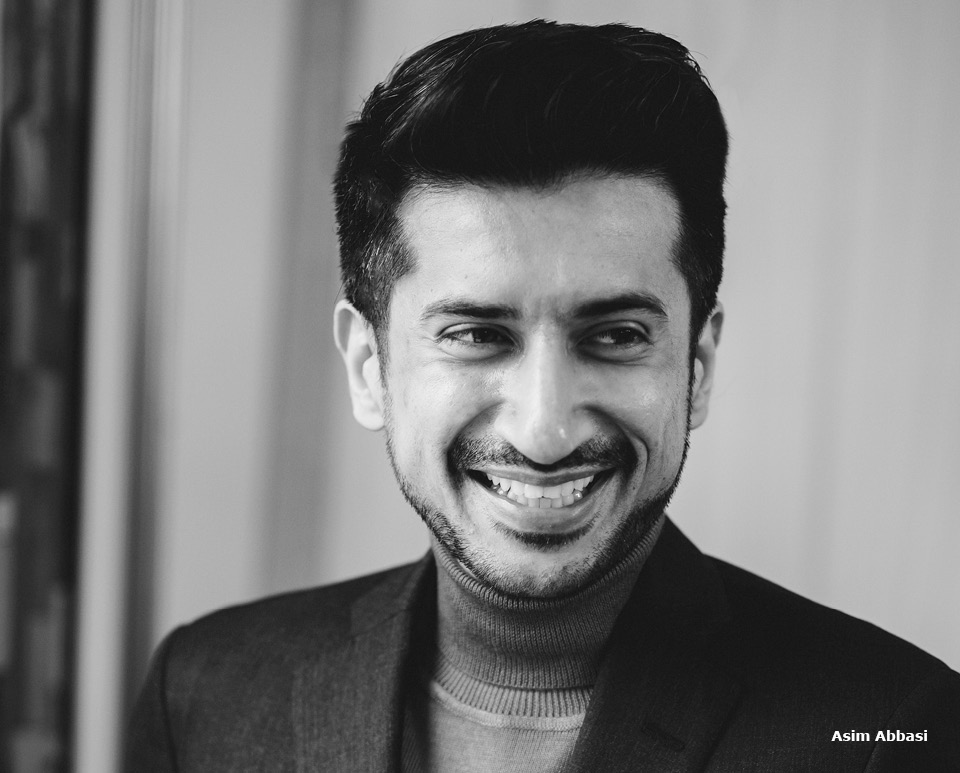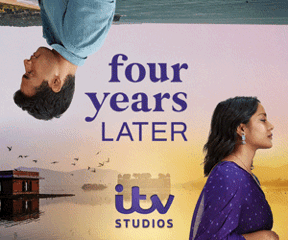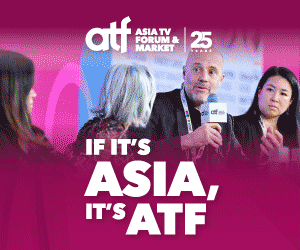
Writer, creator & director Asim Abbasi, talks to ContentAsia’s Janine Stein about his new drama, Churails (Witches), a thriller about four women in Pakistan who form a detective agency to find cheating husbands and find themselves embroiled in a conspiracy. The series is bold, the women are fierce and fearless, and the whole series for India’s Zee5 entertains as well as raises a fist against toxic masculinity.
Why a story about witches? And where did the characters come from? “Churails is a story of four women from different walks of life – two privileged, two from underprivileged backgrounds – whom fate brings together with a common purpose of finding some kind of a redemption. They decide to open a detective agency to find cheating husbands. That’s the starting point of the series and it develops into something more substantial when they come across other women who have been harassed or abused and they become saviours for these women, helping them out in whatever way they can, and then finally finding themselves embroiled in a conspiracy from which they need to save one of their own. Female-centric stories draw me more, I find women more complex and their stories richer, filled with conflicts and I feel like they are underrepresented. All my films have done that to a certain degree. Churails is doing the same thing. But I think in a much bolder and out-there fashion.”
Who is your inspiration for such bold female characters? “I think women I meet everyday. My mother is a very, very strong woman... I have four sisters, so I grew up in a household of women who I have always looked up to and taken inspiration from. I draw a lot from my observations in Pakistan, which is a third-world country, and living in the U.K. which is first world. I think women all around me face different kinds of oppression, different kinds of discrimination, but it’s a global phenomenon and I’ve seen it everywhere... It’s all those women that I’ve seen over my 40 years of existence and captured it somehow and tried to bring it to the show.”
As a man trying to portray female characters, how do you go about digging so deep into the reality of the female experience? “More than...
Writer, creator & director Asim Abbasi, talks to ContentAsia’s Janine Stein about his new drama, Churails (Witches), a thriller about four women in Pakistan who form a detective agency to find cheating husbands and find themselves embroiled in a conspiracy. The series is bold, the women are fierce and fearless, and the whole series for India’s Zee5 entertains as well as raises a fist against toxic masculinity.
Why a story about witches? And where did the characters come from? “Churails is a story of four women from different walks of life – two privileged, two from underprivileged backgrounds – whom fate brings together with a common purpose of finding some kind of a redemption. They decide to open a detective agency to find cheating husbands. That’s the starting point of the series and it develops into something more substantial when they come across other women who have been harassed or abused and they become saviours for these women, helping them out in whatever way they can, and then finally finding themselves embroiled in a conspiracy from which they need to save one of their own. Female-centric stories draw me more, I find women more complex and their stories richer, filled with conflicts and I feel like they are underrepresented. All my films have done that to a certain degree. Churails is doing the same thing. But I think in a much bolder and out-there fashion.”
Who is your inspiration for such bold female characters? “I think women I meet everyday. My mother is a very, very strong woman... I have four sisters, so I grew up in a household of women who I have always looked up to and taken inspiration from. I draw a lot from my observations in Pakistan, which is a third-world country, and living in the U.K. which is first world. I think women all around me face different kinds of oppression, different kinds of discrimination, but it’s a global phenomenon and I’ve seen it everywhere... It’s all those women that I’ve seen over my 40 years of existence and captured it somehow and tried to bring it to the show.”
As a man trying to portray female characters, how do you go about digging so deep into the reality of the female experience? “More than anything else, that’s the most terrifying thought for me because I’m well aware that I am always going to be one degree separated. I do not occupy a woman’s body, I do not walk in a woman’s body. I do not face the same discrimination myself. I see it. So that’s why I talk about the degree of separation and the only way I can counteract that to a certain degree is firstly connecting the stories in a very humane level, where the humanity should be neutral, irrespective of gender and beyond that, surrounding myself with women. With Churails, I had female script consultants who were with me from day one. I had to make sure I was telling the story as authentically as I could from a female perspective. I did not want this to become another male gaze, that’s not what the show was ever meant to be.... surrounding myself with female crew and script consultants and all of that in the development phase really helped make sure I was on the right track.”
This is not the first time you’ve dealt with rape, with other serious, deep and meaningful topics. How did the series push you as a creator? “In unimaginable ways because I think it’s long form so you’re doing 10 episodes, you are almost shooting it as a film, not as a TV serial in Pakistan or a soap. We took our time. It was shot over three months in the summer heat of Karachi, in over 100 locations, with 50+ cast members. It was a very difficult shoot, a very demanding shoot. It pushed me because it made me realise how patient we need to be through the process and always keep the end goal in mind – we were trying to create something that we thought was going to hopefully go someway to changing mindsets. We always had to keep the importance of the project in the forefront because if we were just living for that day, we’d be like ‘okay this is exhausting we can’t do this anymore’. I think the end goal always had to be clear and we had to be always working as a team, I think that’s very very important, we had to have each other’s backs. If that would not have happened, the production would have crumbled.”
Some of the dialogue is pretty honest and direct. Were you concerned about censorship? “I wasn’t because, well, I did worry if there was going to be backlash if people, especially within Pakistan and India, were not used to content... well India now is, but in Pakistan Churails is the first thing like this. What is more important for me and for Zee5 was keeping the authenticity of these characters. Someone from an elite background had to use a certain kind of abuse and someone from the street who is a misfit and had never spoken a word of English had to use a certain kind of abuse... The back story kind of drove that and once that had happened I didn’t want to self-censor because we do that in cinema, we do that in television where there are broadcast regulations. The great thing about a digital release or a digital platform is that it is up till now free of those censor restrictions. So it is very creatively liberating.”
Does living in London liberate you as a filmmaker or do you still hold those traditional Pakistani values? “I think it would be a mix. I am very close to my roots. I am very close to my own culture but I’ve also been in the U.K. for over 20 years so I’ve really literally spent half of my life in both places. So I think what ends up happening is that you have a global outlook, you become a speaker for change and you want things to develop back home as well. That doesn’t mean that you want to get rid of your traditions, your culture and framework. Within that framework, there’s a lot of room for growth and new narratives and new stories. Even with Churails, I’m trying to do something that is culturally specific but speaks to global themes that can resonate with you and anyone else for that matter who doesn’t even know about the Pakistani culture.”
Tell me about the male characters... “There are some antagonists. They are going where they would typically go in a genre show. But I want to talk more about the men who are supporting these women in their missions... it was very important to me for the good guys to not have that toxic masculinity about themselves, who were going to be stopping women from finding their ambition, finding their voice, living their lives the way they want to live. These are all big supporters; they are allies and they are softer, gentler, understanding and empathetic. Those are qualities that are sometimes seen as not appropriate for men because that is what toxic masculinity pushes forward. It tells you, you have to be a certain kind of a man. You have to be aggressive, you have to be alpha... you have to have the power. Churails shifts the power dynamics... I think it’s important to move away from the regressive stereotype we’ve seen for so long.”
The themes that you’ve chosen in the past have been pretty brutal... Have you ever been tempted by the regular romcom, where everyone lives happily ever after? “I’m not adverse to happy endings, as long as they are realistic. My feature film did have certain comical elements, but they came from the actual characters... I didn’t set out to make a comedy. It’s my history that dictates that because I left a career in finance, which I did for 10 years. I moved into filmmaking at 30. In a way, sometimes I feel bad about it because I’ve missed out 10 years of creating something but in a way I’m also really happy because I came into filmmaking mature in my thought process and determined as to what stories I wanted to tell. So the temptation was minimised. Of course if someone comes and says, ‘we’re going to give you lots of money to make a commercial blockbuster but you need to put songs and dances in it, you will think about it twice but up to now I’ve had the strength to say ‘no that’s not what I do’. I’m happy entertaining but there has to be some cathartic, meaningful, social thing happening there for the audiences. They need to take something away from it, it can’t just be they’re only there for the two hours.”
You were an investment banker. At what point were you ready to follow your passion for filmmaking? “I was always passionate about it and investment banking has really long hours. I would sometimes, as an analyst when I started off right out of undergrad school, work for 15-16 hours and still try to write for an hour when I came home. It was very hard, but it was always there. So I spent 10 years doing finance, made a lot of progress and when you’re earning good money, you’re young and you’re like ‘okay, I can defer it’ but I think something switched in me when I was 30. I got married and I had a lot of support from my wife who said ‘okay, go have a difficult conversation with my parents’. I need to have my parents’ blessing every time I do something. So I was kind of scared to have that conversation but my wife pushed me. My mother, who is the dominant one in my house, finally she said ‘okay fine, if you really like it, do it’. She probably thought I would do it for a couple of years...”
You said a few years ago that TV series were not your thing and your heart was actually in feature films. What changed? “I was talking about TV serials in Pakistan, very domesticated, about the struggle of a married woman and her in-laws... rehashed again and again because they rate and audiences watch them... That was something I was avoiding and I’m still avoiding. What I’m getting with Zee5 is a completely different ball game. It’s completely my story, creative freedom, 10 episodes, so it’s still compact compared to that 23-episode serial thing that we have in Pakistan. That’s what made me decide to do this and I have been very happy. I probably have found my right medium. I would love to do more digital series.”
You had real success with your first feature film Cake – Pakistan’s Oscar entry for foreign-language film and currently on Netflix. Do you think the switch between movies and TV will continue? “I think I will keep on switching. With Cake, the theatrical run was amazing, and for your first film to be released in cinema, it has that ego satisfaction, but really the amount of love that I have gotten from Cake once it went digital, because it got more eyeballs, especially in India where it didn’t have a theatrical release... To this day, people are touched by it and they send me emails and messages. It’s very moving to know that it has legs even two years after release. So that aspect of digital is very very exciting. And the second thing that’s exciting about [digital] is the diversification of content... It is always a struggle to get independent films made. It’s the scale films and then the smaller films. And I think that applies to all industries because it’s business first and creative later. Digital is giving the reins back to the content creators and saying ‘you create what suits you, what works for you because what we’re looking for is a diverse library’.”
What’s your opinion on art being informed by political realities, particularly between India and Pakistan? “Art has to stay away from institutional politics. We are doing our own politics. Our politics is to bring people together. It is to bridge the gap to highlight cultural similarities. I hope anyone who has seen Churails in India is saying, ‘hey, we’ve seen this, we know this, this is no different from what is happening here’. I think that similarity is very important because what institutional politics does is focus on the division. For me, personally, I have never experienced this, I’ve been very blessed. Even with Cake... we grew up with old Bollywood songs. I wanted to keep that essence in Cake, so I have a lot of Bollywood songs in Cake. I had a fantastic editor from India, who came to the U.K. to edit for me –Aarti Bajaj. People who watched Cake, actors who watched it in India, tweeted about Cake because they liked it. I think there are a lot of people who want that togetherness, who want us to come together and make content. And yes, sometimes politics will interfere, we’ll fall and then we’ll try to get up again and that’s just what our journey is as artists.”
Published in ContentAsia's Issue Three 2020, October 2020






















